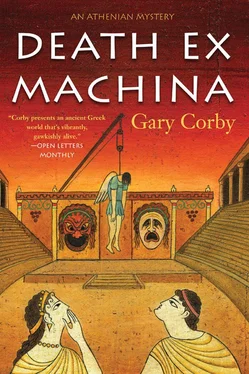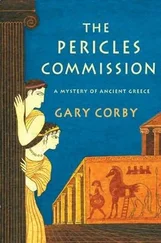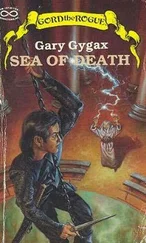Gary Corby - Death Ex Machina
Здесь есть возможность читать онлайн «Gary Corby - Death Ex Machina» весь текст электронной книги совершенно бесплатно (целиком полную версию без сокращений). В некоторых случаях можно слушать аудио, скачать через торрент в формате fb2 и присутствует краткое содержание. Год выпуска: 2015, ISBN: 2015, Издательство: Soho Press, Жанр: Исторический детектив, на английском языке. Описание произведения, (предисловие) а так же отзывы посетителей доступны на портале библиотеки ЛибКат.
- Название:Death Ex Machina
- Автор:
- Издательство:Soho Press
- Жанр:
- Год:2015
- ISBN:978-1-61695-520-5
- Рейтинг книги:3 / 5. Голосов: 1
-
Избранное:Добавить в избранное
- Отзывы:
-
Ваша оценка:
- 60
- 1
- 2
- 3
- 4
- 5
Death Ex Machina: краткое содержание, описание и аннотация
Предлагаем к чтению аннотацию, описание, краткое содержание или предисловие (зависит от того, что написал сам автор книги «Death Ex Machina»). Если вы не нашли необходимую информацию о книге — напишите в комментариях, мы постараемся отыскать её.
Death Ex Machina — читать онлайн бесплатно полную книгу (весь текст) целиком
Ниже представлен текст книги, разбитый по страницам. Система сохранения места последней прочитанной страницы, позволяет с удобством читать онлайн бесплатно книгу «Death Ex Machina», без необходимости каждый раз заново искать на чём Вы остановились. Поставьте закладку, и сможете в любой момент перейти на страницу, на которой закончили чтение.
Интервал:
Закладка:
“Who else, then?” the Basileus challenged.
I said, “Theokritos the High Priest of Dionysos is a popular man. The workers at his vineyards would do anything for him.”
I paused, then added. “Theokritos also leads the association of vintners.”
“Surely you are not about to accuse all of our winemakers!” the Eponymous Archon said.
Athens would still need her winemakers after this was over. I said, “I merely point out the economic motive, sir. Theokritos himself was moved by his religious devotion. Anyone who’s spoken to him can tell you he is devoted to Dionysos.”
“That’s fairly normal for a high priest, don’t you think?” the Eponymous Archon said sarcastically.
“Yes, sir. But the point is Theokritos had a ready-made group of followers, if he chose to use it.” I quickly drew breath before he could argue again and carried on. “Then there is Thodis, the choregos, who also has a group: the friends who advised him to get into the theatrical business.”
Thodis scowled angrily but remained silent. No doubt he would speak after he’d taken advice from his friends.
“What of Lakon?” Aeschylus asked.
I said, “Lakon might have been able to persuade his fellow actors to join him in revenge on Romanos, particularly if they knew it had been Romanos who was sabotaging them. The family of Phellis might happily have joined in.”
That completed the list of possible murderous conspiracies. Everybody whom I’d mentioned was glaring at me.
“Which of these groups, then?” I asked. “Or more to the point, which of their leaders? Theokritos, Thodis, Petros, or Lakon?
“None of them make any sense,” Sophocles said. “You forget, Nicolaos, that my play was sabotaged right from the start. Thodis would not wish to destroy the play; he paid for it! Lakon would not damage his biggest role. The High Priest of Dionysos would sooner die than harm the Great Dionysia, and I dare say the metics desperately needed the income Romanos brought in.”
“Yes, that confused me too, sir,” I said. “But there was another possibility: Romanos himself. Romanos yearned above all else to become a citizen of Athens. We know this because he said so, to Diotima and me, under a rain-soaked stoa. He questioned Diotima closely as to how her father Pythax had achieved his citizenship.”
“Through his vast merit,” Aeschylus said. “I know Pythax and I would be proud to stand beside him in the line as a fellow citizen.”
“I said the same thing,” I said ruefully. “I didn’t know then that Romanos had already reached the same conclusion. How many men are gifted with an opportunity to display their talents in the way that makes a whole city admire them? It’s not a question of merit, it’s a question of a crisis occurring that brings you to the fore, or being in the right place at the right time.”
“Yes, I concede this difficulty,” Aeschylus said. “These things are as the Gods ordain.”
“Sometimes the Gods get assistance. Romanos decided to make his own crisis. One that would bring his talents to the attention of every man in Athens.”
I paused, then said, “It was Romanos who sabotaged the play.”
Silence, for a long moment. I wondered if the audience would believe it.
“Romanos manufactured the crisis?” said Sophocles, aghast. “But … but … he helped to solve it. He was instrumental in saving us.”
“Yes, precisely!” I said. “Because of that, we suddenly noticed a man we had always taken for granted. Romanos even said to me that Romanos is the man Sophocles calls for when he’s run out of other good options.”
“I see.” Sophocles looked ashen. “I helped bring on this crisis by taking a man of talent for granted.”
“I’m afraid so. He was probably inspired by the skene painting. It contained enough incidental disasters to make the situation look spooky. He complained to the stage manager to force Akamas to work back late one night, then appeared wearing a mask to create the rumor of a ghost. He laid the first trap for himself, to allay suspicion: he tripped over a broom. There was no danger, not for a man who has played comic falls on stage. The next two incidents were far more serious: the balcony attempt and the fall of Phellis.”
I could see people puzzling through the idea. A few looked convinced.
I said, “Lakon is extraordinarily lucky that Sophocles refused to hire Romanos as second actor. If he had, it would have been Lakon, rather than Phellis, who had the near-fatal accident. Romanos, you see, had to step into a higher role to save the day.”
Lakon paled at my words. He understood that what I described was possible.
“Not only that,” I continued, “Romanos had to save not only the play-actors step into emergency roles quite often-but Romanos had to be seen to save a major festival. And not just any festival, but the Great Dionysia, which all the world attends.”
“This seems a big stretch,” Aeschylus said. “What possible good could come of this?”
“Imagine if Romanos had not died. Imagine if the Dionysia had proceeded. We all remarked how Romanos worked like a slave to recover the festival. You yourself, Sophocles, said that Romanos had been instrumental.”
Sophocles said. “That is true. I was wondering how I might reward him for his good work.”
“Had he lived, and had you asked him, he would have asked you to sponsor him for citizenship.”
Sophocles frowned. “Such a thing is highly uncertain, and extremely rare. How could Romanos have thought I could deliver on such a request?”
“You underrate yourself, Sophocles. The people respect you. Everyone knows you are the obvious successor to Aeschylus.” I turned to Aeschylus. “You said, sir, that you would be proud to stand beside Pythax. How would you feel about a metic who almost single-handedly dragged the Great Dionysia back from the brink of disaster?”
“I would support him for citizenship,” said the master playwright. “Of course I would.”
I turned back to Sophocles. “You see? If you and Aeschylus made the request, especially with Aeschylus retiring, how could the citizen body deny you? The People’s Assembly would declare Romanos a citizen by acclamation.”
“I see the logic of your words.” Sophocles’s voice wavered. He was deeply upset. “Yet still I’m astounded. How could he have taken us all in?”
“Because he was a great actor.”
Sophocles nodded. “That he was.”
“There is this to remember about Romanos: that he was a curious mix of a great man who would work his heart out for the theater, but who was utterly amoral when it came to his own ambitions. The stage manager told of us of an incident years ago, when Romanos saved a play by brilliant improvisation after the skene collapsed. This was the same man who blackmailed without hesitation. He was prepared to cripple Phellis and bring the Dionysia to the brink of disaster. Then he drove himself to save the play he almost destroyed.
“Kebris told us that Romanos began to teach him the third actor’s lines even before the crisis had begun. That seems extraordinary.”
All eyes turned to Kebris.
“Because my friend feared for his life,” Kebris said angrily. “I don’t believe your fantasy for a moment. Romanos said he wanted me to know his lines in case something happened to him.”
“Yes, Kebris,” I said. “I don’t doubt you for a moment. But Romanos didn’t teach you the lines because he thought something might happen to him. He taught them because he knew something was about to happen to Phellis.”
I paused to let that sink in. I could see the thoughts rearrange themselves in people’s minds. Then I said, “Romanos prepared for his own promotion in advance. Why? So that when the crisis came he would be the hero who saved the show.”
Читать дальшеИнтервал:
Закладка:
Похожие книги на «Death Ex Machina»
Представляем Вашему вниманию похожие книги на «Death Ex Machina» списком для выбора. Мы отобрали схожую по названию и смыслу литературу в надежде предоставить читателям больше вариантов отыскать новые, интересные, ещё непрочитанные произведения.
Обсуждение, отзывы о книге «Death Ex Machina» и просто собственные мнения читателей. Оставьте ваши комментарии, напишите, что Вы думаете о произведении, его смысле или главных героях. Укажите что конкретно понравилось, а что нет, и почему Вы так считаете.












